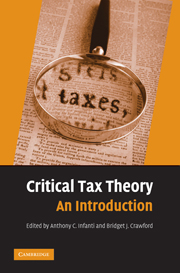Book contents
- Frontmatter
- Contents
- List of Illustrations
- List of Tables
- List of Contributors
- List of Common Abbreviations
- Introduction
- CHAPTER 1 FOUNDATIONS OF CRITICAL TAX THEORY
- CHAPTER 2 HISTORICAL PERSPECTIVES ON TAXATION
- CHAPTER 3 THE GOALS OF TAX POLICY
- CHAPTER 4 CRITICAL TAX THEORY MEETS PRACTICE
- CHAPTER 5 RACE AND TAXATION
- CHAPTER 6 GENDER AND TAXATION
- CHAPTER 7 SEXUAL ORIENTATION AND TAXATION
- CHAPTER 8 THE FAMILY AND TAXATION
- CHAPTER 9 CLASS AND TAXATION
- Women, Poverty, and the Tax Code: A Tale of Theory and Practice
- The Working Poor Are Paying for Government Benefits: Fixing the Hole in the Anti-Poverty Purse
- Welfare by Any Other Name: Tax Transfers and the EITC
- Race, Class, and the Internal Revenue Code: A Class-Based Analysis of A Black Critique of the Internal Revenue Code
- CHAPTER 10 DISABILITY AND TAXATION
- CHAPTER 11 GLOBAL CRITICAL PERSPECTIVES ON TAXATION
- CHAPTER 12 CRITICAL PERSPECTIVES ON CRITICAL TAX THEORY
- Index
Women, Poverty, and the Tax Code: A Tale of Theory and Practice
Published online by Cambridge University Press: 04 August 2010
- Frontmatter
- Contents
- List of Illustrations
- List of Tables
- List of Contributors
- List of Common Abbreviations
- Introduction
- CHAPTER 1 FOUNDATIONS OF CRITICAL TAX THEORY
- CHAPTER 2 HISTORICAL PERSPECTIVES ON TAXATION
- CHAPTER 3 THE GOALS OF TAX POLICY
- CHAPTER 4 CRITICAL TAX THEORY MEETS PRACTICE
- CHAPTER 5 RACE AND TAXATION
- CHAPTER 6 GENDER AND TAXATION
- CHAPTER 7 SEXUAL ORIENTATION AND TAXATION
- CHAPTER 8 THE FAMILY AND TAXATION
- CHAPTER 9 CLASS AND TAXATION
- Women, Poverty, and the Tax Code: A Tale of Theory and Practice
- The Working Poor Are Paying for Government Benefits: Fixing the Hole in the Anti-Poverty Purse
- Welfare by Any Other Name: Tax Transfers and the EITC
- Race, Class, and the Internal Revenue Code: A Class-Based Analysis of A Black Critique of the Internal Revenue Code
- CHAPTER 10 DISABILITY AND TAXATION
- CHAPTER 11 GLOBAL CRITICAL PERSPECTIVES ON TAXATION
- CHAPTER 12 CRITICAL PERSPECTIVES ON CRITICAL TAX THEORY
- Index
Summary
Being a tax professor at a conference on women and poverty is a little bit like, well, being an expert on women and poverty at a conference on taxation. For one thing, there is the topic, which suggests a political approach not necessarily consistent with that with which one is familiar. For another thing, there is the sense that other lawyers look at tax experts the way everyone else looks at lawyers: about as interesting as plumbers, but without the self-confident charm. Additionally, there is the tax professor's fear that the more one tries to escape these contradictions the more deeply the contradictions will engulf him: poverty is a serious matter, and the nerdy cleverness of most tax scholarship is hardly likely to satisfy those who live in economic deprivation. Rather than being clever, then, I will simply discuss some current issues in tax policy as they relate to women, poverty, and the relationship between the two.
TAX SCHOLARSHIP AND THE SPACE FOR GENDER AND POVERTY ISSUES
Tax scholars see women and poverty through a very particular lens. On the one hand, the tax field has a long history of concern with distribution and “fairness” issues. The progressivity of the Code – that is, the imposition of higher tax rates on those with higher taxable incomes – is a major theme in tax scholarship and is often justified by reference to political philosophers and other nontax sources.
- Type
- Chapter
- Information
- Critical Tax TheoryAn Introduction, pp. 270 - 275Publisher: Cambridge University PressPrint publication year: 2009



